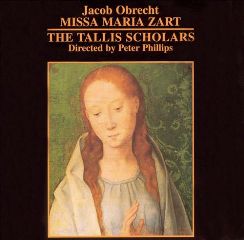Jacob Obrecht - Missa Maria Zart (1996)
Jacob Obrecht - Missa Maria Zart (1996)

1. Obrecht: Missa Maria zart: Kyrie 7:24 2. Obrecht: Missa Maria zart: Gloria 16:04 3. Obrecht: Missa Maria zart: Credo 15:51 4. Obrecht: Missa Maria zart: Sanctus & Benedictus 16:11 5. Obrecht: Missa Maria zart: Agnus Dei 13:53 The Tallis Scholars: Paul Agnew Tenor (Vocal) Tessa Bonner Soprano (Vocal) Charles Daniels Tenor (Vocal) Sally Dunkley Soprano (Vocal) Donald Greig Bass (Vocal) Robert Harre-Jones Tenor (Vocal) Leigh Nixon Tenor (Vocal) Francis Steele Bass (Vocal) Peter Phillips Choir Director, Producer
The late-15th-century Flemish composer Jacob Obrecht is another of the great neglected masters of the Renaissance. His Missa Maria zart (based on a German song in honor of the Virgin Mary) is, at more than 70 minutes, by far the longest Renaissance Mass cycle to have survived. Obrecht's writing in this Mass tends to be dense as well as profuse; it's rewarding, but it requires concentration from both performers and listeners. Phillips's tempos are a bit on the slow side, and the music's momentum gets lost occasionally, but the Tallis Scholars' singing is always perfectly tuned and blended. (For a fine and affordably priced introduction to Obrecht, try the Missa Caput on Naxos.) --Matthew Westphal, amazon.com
This is a bizarre and fascinating piece: and the disc is long-awaited, because The Tallis Scholars have been planning it for some years. It may be the greatest challenge they have faced so far. Normally a Renaissance Mass cycle lasts from 20 to 30 minutes; in the present performance, this one lasts 69 minutes. No ‘liturgical reconstruction’ with chants or anything to flesh out the disc: just solid polyphony the whole way. It seems, in fact, to be the longest known Renaissance Mass.
It is a work that has long held the attention of musicologists: Marcus van Crevel’s famous edition was preceded by 160 pages of introduction discussing its design and numerology. And nobody has ever explained why it survives in only a single source – a funny print by a publisher who produced no other known music book. However, most critics agree that this is one of Obrecht’s last and most glorious works, even if it leaves them tongue-tied. Rob C. Wegman’s recent masterly study of Obrecht’s Masses put it in a nutshell: “Forget the imitation, it seems to tell us, be still, and listen”.
There is room for wondering whether all of it needs to be quite so slow: an earlier record, by the Prague Madrigal Singers (Supraphon, 6/72 – nla), got through it in far less time. Moreover, Obrecht is in any case a very strange composer, treating his dissonances far more freely than most of his contemporaries, sometimes running sequential patterns beyond their limit, making extraordinary demands of the singers in terms of range and phrase-length. That is, there may be ways of making the music run a little more fluidly, so that the irrational dissonances do not come across as clearly as they do here. But in most ways it is hard to fault Peter Phillips’s reading of this massive work.
With only eight singers on the four voices, he takes every detail seriously. And they sing with such conviction and skill that there is hardly a moment when the ear is inclined to wander. As we have come to expect, The Tallis Scholars are technically flawless and constantly alive. Briefly, the disc is a triumph. But, more than that, it is a major contribution to the catalogue, unflinchingly presenting both the beauties and the apparent flaws of this extraordinary work. Phew! -- David Fallows, Gramophone [3/1996]
download: uploaded anonfiles yandex 4shared solidfiles mediafire mega filecloudio
